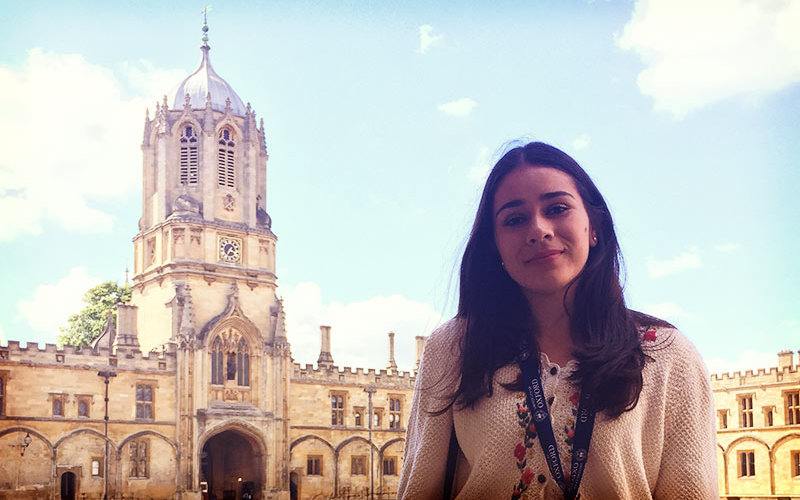
Undergraduate Elizabeth Mercado Ayón wants to become a neuroscientist, and her research experience at the University of Oxford in England this summer is helping her work toward that goal.
“Studying abroad and conducting research expands my perspective of the world, both academically and personally,” said Ayón, a biological science major pursuing a concentration in molecular biology and biotechnology.
“The students here are from very diverse backgrounds. There are so many cultures, languages and different ways of thinking, but at the end of the day, science is universal. And, even though in the lab we all have different projects, we all have the same purpose, which is to better understand life.”
Ayón is among 14 university students, including six from CSUF, who are spending 10 weeks this summer conducting research in Argentina, the United Kingdom, Thailand and Canada through the Minority Health and Health Disparities International Research Training Program, known as MHIRT. Since 2006, Marcelo Tolmasky, CSUF professor of biological science and award-winning researcher, has been leading the program, which started on campus more than 20 years ago.
Funded by the National Institutes of Health, Tolmasky has received more than $3 million over the years for the program, in which scholars from CSUF and other U.S. universities, including California State University campuses, are selected. The scholars are exposed to minority and international health problems and seek novel approaches. Scholars also collaborate on research projects to address health disparities from a global health perspective, Tolmasky said.
At Oxford, Ayón is investigating the molecular mechanism responsible for how antibiotic resistance traits are maintained and propagated among pathogenic bacteria. She is working with Tolmasky, an accomplished researcher in antibiotic resistance, and Oxford’s David Sherratt, Iveagh professor of microbiology in the Department of Biochemistry. Sherratt’s studies are aimed at understanding how DNA replication, repair and chromosome unlinking shape bacterial chromosome organization in the context of the living cell.
Ayón’s research experience at Oxford, and in Tolmasky’s lab, has been valuable in preparing her for doctoral studies after she graduates next year.
“It has given me a jumpstart on my career. I’ve been able to put into practice many skills that are crucial to learn to work as a scientist,” said Ayón, a student in the Ronald E. McNair Scholars Program and a 2017-18 Sally Casanova Pre-Doctoral Scholar, in which both programs support students pursuing doctoral studies.
“I enjoy doing research because it allows me to ask questions, make observations, evaluate evidence and solve problems. Being able to solve those problems is very rewarding. Understanding life at such a complex, yet beautiful, level gives me a feeling of fulfillment and satisfaction — and working in an Oxford laboratory is so cool!”
The other CSUF students in this summer’s MHIRT program are:
Chiang Mai University, Department of Community Medicine, Thailand
- Amanda Kammer, ’17 (B.S. in health science)
- Hannah Montgomery, ’17 (Master of Public Health)
- Gloria “Alex” Gallardo and Siena Morgan, both are health science majors
King’s College London, Institute of Pharmaceutical Science, United Kingdom
- Joshua Phelan, biological science major